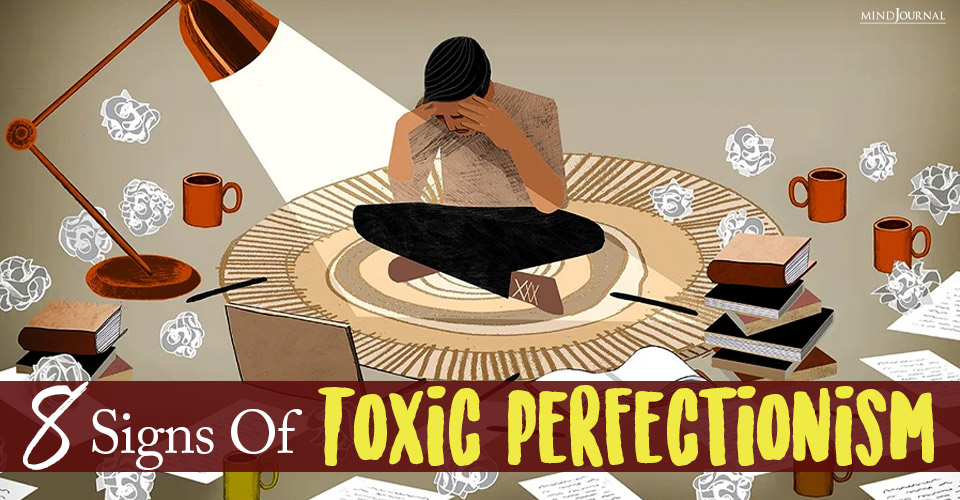Being a perfectionist is not always a bad thing. Wanting to do everything perfectly, and wanting to give something your all are admirable traits to have. But what happens when being a perfectionist starts to consume you? What happens when anything less than that bothers you and makes you feel that you didn’t do enough? I will tell you what happens: Toxic perfectionism.
If both these questions resonated with you, chances are you’re a toxic perfectionist. Being a toxic perfectionist doesn’t really mean that you just need to be perfect in everything. It doesn’t mean that you’re always ‘Employee of the Month’. It runs much deeper than that and can cause more damage than you think.
What Is Toxic Perfectionism?
Toxic perfectionism is that niggling feeling that constantly tells you that you cannot be less than perfect, and anything less than absolute perfection is unacceptable.
When you constantly tell yourself things like, ‘This is not perfect! This has to be perfect!’, ‘If it’s not perfect, it’s not worth it.’, and ‘I am a loser if I don’t do this perfectly.’, know that you have turned into a toxic perfectionist.
You focus on perfection, but you don’t realize what you’re giving up in the process. You start being extremely hard on yourself, beat yourself up constantly, and associate your self-worth with your perfectionistic tendencies. Needless to say, this kind of emotional and mental narrative is not healthy for you at all.
Related: The Perfectionist’s Trap: How Perfectionism Robs Us Of Our Humanity
8 Signs Of Toxic Perfectionism

1. Setting abnormal and extremely lofty goals for yourself.
Deep down inside you know that it’s not possible, and even if you do make it work in some way, it’s going to take a lot out of you. But you still go ahead, because that little voice in your head is constantly telling you that absolute perfection is everything, and you should only focus on that.
You think that rules are applicable only for those people who are not perfectionists like you, because you need and should be the best amongst everyone. Toxic perfectionism convinces you that you have no option other than to follow through with every difficult goal, no matter how much you might suffer and lose yourself in the process.
2. Unable to acknowledge and celebrate your achievements and successes.
No matter how perfectly you might do your job and finish your assignments, you will still feel unsatisfied with your efforts. You will constantly feel that you could have done better. You find it hard to congratulate yourself on a job well done, instead you nitpick every little aspect and think about what you could have done differently.
You keep on finding flaws and self-complain till the point when you start hating yourself. Feeling like an imposter and angry at yourself, you vow to do a ‘better job’ next time, and just like this, the vicious wheel of toxic perfectionism keeps on spinning.

3. Your accomplishments define your self-esteem and self-worth.
When you are a toxic perfectionist, you define yourself on the basis of what you have achieved and accomplished. Your accomplishments decide how good, successful and ‘useful’ you are to others and society in general. Validation and approval from others are the only things that make you feel good about yourself.
You compare yourself with others and calculate exactly how much you have accomplished compared to them. For example, if someone has bought a big home in the suburbs and you ‘just have a 3-room apartment in the city’, you feel that you are not successful enough in life. If one of your friends has a Mercedes and you have a Subaru, you will start feeling bad about yourself and your life.
Every time you tell yourself that you haven’t done enough or that you’re less compared to others, your self-esteem and self-worth take a deep nosedive.
Related: The Truth About Perfectionism: 5 Signs You May Be Perfectionist
4. Obsessively checking your social media multiple times a day.
You are always hooked on your social media because you want to know what others are doing, what they are achieving in life, and how others regard you from the outside. Repeatedly checking your social media becomes an important part of your day, and it is something that gradually makes you feel worse, without you even realizing it.
Seeking validation is okay sometimes, but if you are heavily dependent on what others are thinking about you, how others perceive you, and if you keep on comparing your life with theirs and judge yourself, then you will never be happy. No matter how great your life might be, nothing will ever be enough.
5. You don’t take kindly to any sort of criticism.
Even if it’s constructive criticism, a toxic perfectionist will always have a hard time dealing with it. You have set extremely high standards for yourself, and anything less than that tends to flip you off. You don’t like making mistakes, so when someone offers you some well-meaning and constructive criticism, you end up filtering everything and only focus on the negative parts.
This kind of filtering makes you feel that they are attacking you and want to insult you and put you down, which is why you quickly get defensive. Getting angry and defensive whenever you have criticism coming your way is a sure-shot sign of toxic perfectionism.
6. Being hard on yourself for being ‘average’.
Being average is not an option for you at all, and you always set your sights on being the very best there is. You come up with difficult plans, and overambitious goals and then give rigorous efforts to fulfill them all. But if it happens that things did not pan out the way you wanted them to, you come down hard on yourself for not doing a good job.
Additionally, you also avoid trying out new things because subconsciously you have this fear that you are incapable of doing it perfectly the very first time. You feel dissatisfied, guilty, and angry doing anything that is less than perfect.
Related: 17 Signs You Are An Overachiever And How To Deal
7. You are constantly plagued by self-doubt.
You always doubt yourself when it comes to your performance, abilities, and decisions, and even if you get high praise from others, deep down inside you believe that you didn’t do well. Toxic perfectionism makes you depend on others’ approval and praise for having good self-worth, so it’s no wonder that you’re always overthinking about what you did and didn’t do.
Your self-doubt stops you from feeling confident and assured about your efforts, talent and accomplishments. It constantly tells you that if others are not validating you, none of it matters and you should keep on working hard unless everything is absolutely ‘perfect’.
8. Your life is controlled by the word ‘Should’.
“I should do this.”
“I should not make any mistakes.”
“I should get this promotion.”
“I should have known better.”
“I should have done a better job.”
When your life is controlled by the word ‘Should’, that is when you know you are in deep trouble. Toxic perfectionism makes you feel like there should never be any scope for mistakes. You tell yourself how you cannot afford to make mistakes and be imperfect because your internal dialogue doesn’t let you.
Separating feelings from facts is a massive challenge for you, and you keep on putting enormous pressure on yourself for doing things ‘right’. This kind of mindset causes a lot of suffering, unhappiness, and insecurity within you.
Want to know more about toxic perfectionism? Check this video out below!
4 Ways You Can Deal With Toxic Perfectionism
1. Practice self-compassion.
When you are kind and compassionate towards yourself, it can help you let go of the constant pressure you put yourself in to be perfect. Self-compassion is the exact opposite of toxic perfectionism; while the latter tells you to be nothing less than perfect, the former tells you that sometimes it’s okay if things don’t work out the way you want.
When you are compassionate towards yourself, you stop relying on other people’s opinions and approval to be happy and focus on what YOU think makes you happy. Whenever you feel like you’re drowning under the pressure of perfection, stop yourself and replace the unkind thoughts with some kind ones.
Related: How Self-Compassion Can Fight Perfectionism
2. Stay away from procrastination.
Procrastination is one of the major side-effects of toxic perfectionism, and if it’s adding to the pressure of being perfect all the time, don’t worry because there’s light at the end of the tunnel.
Whenever you find yourself procrastinating because the task feels too tough and overwhelming, try to break them into smaller tasks and finish them one at a time. Take breaks occasionally, try not to get overwhelmed, don’t constantly think that you will fail or won’t do a good job, and most importantly, reward yourself for a job well done.

3. Maintain a journal.
Journaling is one of the best and most effective ways of dealing with something like this. Whenever you feel those negative thoughts coming on, grab your journal and write them all down. Penning your thoughts on paper can help you understand them better, and can help you reframe them.
The moment you start being attentive to your real thoughts, and feelings and work towards challenging your negative thought patterns, is the moment your recovery begins. These practices can help you be less self-deprecating and critical.
4. Go for therapy with qualified professionals.
If your toxic perfectionism has started to negatively affect your mental health, and you find yourself depressed and anxious more often than not, then going to therapy is a good option. A therapist can help you deal with your feelings in a healthier and more constructive way.
Going for a qualified professional to help you deal with this shows your strength and determination, and if you feel that your perfectionism is making you unhappier with every passing day, then therapy is probably the right answer for you.
Related: How to Stop Perfectionism From Controlling Your Life
Always remember that perfection is not everything, and being perfect all the time should not be the ultimate goal in life. No human is flawless and that’s the beauty of it all. Let go of the belief that you need to be perfect to be good or talented or successful or happy, and instead focus on accepting yourself for who you are. Self-acceptance and self-compassion do not just help you feel happier and more fulfilled, but can also help you go a long way in life.











Leave a Reply